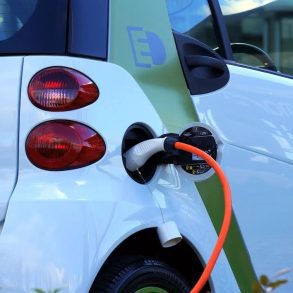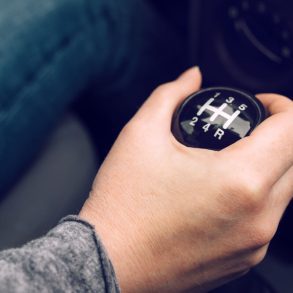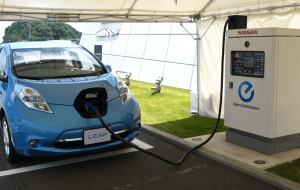
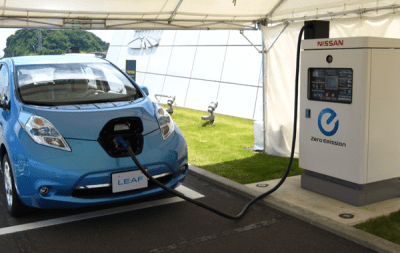 With new technology, there is always a period when regulations and good practices haven’t kept up with the new situations that this technology can put people into.
With new technology, there is always a period when regulations and good practices haven’t kept up with the new situations that this technology can put people into.
When automobiles were introduced over 100 years ago, it didn’t take long for speed limits to be introduced, as pedestrians at that time were only familiar with horses walking through the streets. So when they wanted to cross the road, they didn’t expect those motorized carriages to approach as quickly as they were.
Fast forward to 2013, when a Georgia owner of a Nissan Leaf Electric vehicle was arrested and charged with stealing about 5 cents worth of electricity when he plugged his car into a EV charging station at his son’s school while he was attending a tennis practice. He spent more than 15 hours in jail for charging his car for 20 minutes at the school’s expense.
The man acknowledges he hadn’t asked permission first. “When I got there, there was nobody there. It was a Saturday morning,” he said. But the arresting Police Officer was clear about his thoughts on the subject. “A theft is a theft” he said. When asked if he’d make the arrest again, he answered: “Absolutely.”
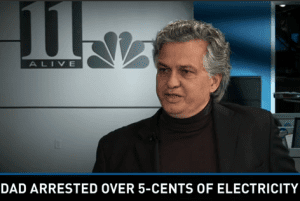
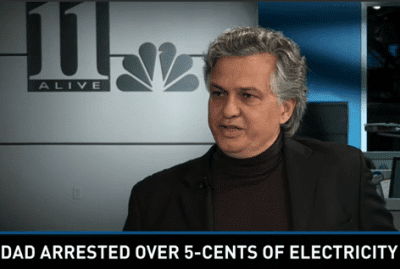 As the “electricity thief” will very likely take this to court, this will start a precedent, either positive or negative for EV owners. If anything, it does makes clear that there is a need to start the discussion on this subject in order to educate people on the cost of EV charging and to come up with some good practices for the future, so this kind of misunderstanding does not need to happen again.
As the “electricity thief” will very likely take this to court, this will start a precedent, either positive or negative for EV owners. If anything, it does makes clear that there is a need to start the discussion on this subject in order to educate people on the cost of EV charging and to come up with some good practices for the future, so this kind of misunderstanding does not need to happen again.
It is a difficult discussion, though.
Although there is consensus that the arrest was disproportional to the “crime” committed, those who oppose the public use of a school charger, put forward arguments like:
- Stealing is stealing, regardless of the damage. He sets a bad example, teaching his child that it’s okay to take what doesn’t belong to him, just because it’s “only 5 cents”.
- Electricity is not free, even from a public school. You don’t take a computer, or a desk, from the school whenever you happen to need it, just because you’ve paid your taxes.
- You don’t plug your car into your neighbors’ power outlet without asking, and you don’t wash your car with water that’s “stolen” from your neighbor either. So why should it be okay at a school?
On the other hand, those who support the EV-owner, substantiate their opinion with arguments like:
- A lot of people at a public school or library charge their cell phones or laptops from the power outlets. Should they be arrested too?
- What about drinking water from the tap without asking? Or flushing the toilet? That would also be considered theft of public utilities.
The problem is: charging a car has a different feel to it and it is in a different frame-of-mind to the public compared to charging a cell phone or laptop. And so does drinking water from the tap. That may be a result of the public unawareness of the cost of electricity, or of the amount of power used to charge an EV. Obviously, Nissan and other manufacturers of electric cars will be delighted about the publicity this gives to EVs in general, and specifically the low cost of charging them.
But the real discussion that should be started is: “Should charging an electrical device in general be considered theft?”
Apparently, it’s nothing new: last year, a homeless man was arrested for charging his cell phone at a public power outlet.
So where do we draw the line? At cell phones? Or are laptops okay too? Then why not cars?
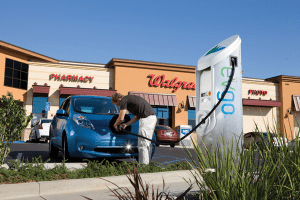
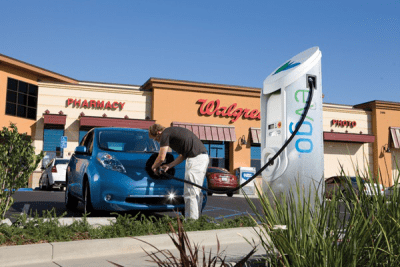 And what about WHO charges their device? Is it okay for employees of a business to plug in their cell phone/laptop/car? Then what about (paying) customers? Or third parties as well? And at a public property: should teachers or doctors be allowed to charge their private cell phones at school or in the hospital? Then why not students, or patients? Or parents of students, visitors of patients?
And what about WHO charges their device? Is it okay for employees of a business to plug in their cell phone/laptop/car? Then what about (paying) customers? Or third parties as well? And at a public property: should teachers or doctors be allowed to charge their private cell phones at school or in the hospital? Then why not students, or patients? Or parents of students, visitors of patients?
Or what about when electric cars will be able to discharge electricity back to the power grid? Would in this case the school be charged with theft?
As you see, a lot of questions will be raised because of this subject. So we should all thank the Chamblee Police Officer for his disproportional arrest, as it has opened a can of worms that will help start a public discussion on good manners, use of public resources and at the same time educate people of the benefits, drawbacks and running costs of electric vehicles.
I’m not saying we should draw a line somewhere, or make rules or laws about this subject. There are already too many rules and laws in this world, and especially when government starts to interfere, things tend to get complicated very quickly. Common sense and good manners go a long way. Simply asking permission beforehand gets you a positive answer most of the time.



